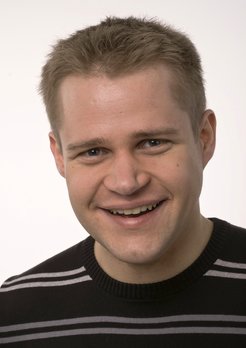Hannover 2014 Science Prize for Dr. Oliver Gerberding
High-precision measurement technologies for future gravitational wave detectors
Dr. Oliver Gerberding is awarded the Hannover 2014 Science Prize of the Leibniz University Society Hannover e.V. for his outstanding doctoral thesis “Phase Readout for Satellite Interferometry”. The prize for his dissertation on the development of particularly precise measurement methods for future gravitational wave detectors is endowed with 5,000 euros and will be awarded on 25 November 2014 in the Eilenriedestift e.V. festival hall in Hanover.
Gravitational waves are an almost 100-year-old prediction from Albert Einstein's general theory of relativity. Their direct effects - a tiny stretching and compressing of space - have never been directly observed. In the next few years, existing large gravitational wave detectors on Earth are expected to provide this observation for the first time using high-precision laser distance measurements.
However, on the ground, seismics prevents the measurement of low-frequency gravitational wave signals, which are of particular interest to astronomers. For this reason, the space mission eLISA, which is scheduled to be launched in 2034, will bring gravitational wave detection into space for the first time. eLISA will consist of three satellites that follow the Earth on its orbit around the Sun at a distance of millions of kilometres from each other. They will use lasers to determine their distance from each other to the nearest billionth of a millimetre in order to measure gravitational waves. eLISA will detect a wide range of different signals and thus perform true gravitational wave astronomy.
Phase meter for ultra-precise distance measurement

In his PhD thesis Oliver Gerberding developed design, construction and testing of phase measurement systems for ultra-precise laser-based length measurements at low frequencies. These systems are crucial components of future experiments in gravitational physics like eLISA. The focus of the dissertation is the development and implementation of computational methods (algorithms) for these readout systems on fast, parallel working microchips.
The results of Gerberding's PhD thesis are applied to the planned space-based gravitational wave detector eLISA. They can also be used in the satellite-based geodesy mission GRACE Follow-On. GRACE Follow-On will monitor climate change indicators by measuring the earth's gravitational field. Based on his results, Gerberding also developed special phase measuring instruments for further laboratory experiments at the Albert Einstein Institute in Hanover.
The prize winner was part of a team that developed a prototype of the phase meter for the eLISA mission in a technology development project of the European Space Agency ESA. He was responsible for central tasks of the instrument, especially for the high-precision distance measurement of the satellites. This project was successfully completed in March 2014 and the phase meter has since been available in Europe as one of the central components of the eLISA technologies.
Dr. Oliver Gerberding
(born 1986) studied Technical Physics with a focus on nanoelectronics at Leibniz Universität Hannover from 2005 to 2009. He completed his PhD thesis in the “Space Interferometry” group in the “Laser Interferometry and Gravitational Wave Astronomy” division of the Max Planck Institute for Gravitational Physics Hannover, headed by PD Dr. Gerhard Heinzel and Prof. Dr. Karsten Danzmann. After receiving his doctorate in July 2014, he moved to the National Institute of Standards and Technology, Gaithersburg, and the Joint Quantum Institute of the University of Maryland (USA), where he has since been working as a guest scientist on opto-mechanical acceleration sensors.
The Hannover Science Award
The Hannover Science Prize, which the Leibniz Universitätsgesellschaft Hannover e.V. has awarded every two years since 1990 for outstanding dissertations by young scientists, is the most important prize of its kind awarded at Leibniz Universität.
In 2014, a total of four young scientists were awarded a certificate signed by the Chairman of the University Society, Prof. Dr. Hannes Rehm, and the President of Leibniz Universität, Prof. Dr.-Ing. Erich Barke, and prize money of 5,000 euros each.












